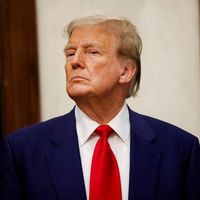Iran Slams New Western Sanctions, Threatens Retaliation
Iran slammed new sanctions imposed by the European Union and Britain and said it would retaliate, although the EU stopped short of listing the IRGC as terror group.
"The Islamic Republic will soon announce the list of new sanctions against the human rights violators of EU and England," Iran's Foreign Ministry Spokesperson Nasser Kanaani said in a statement.
At the same time, a Tehran newspaper carried the headline, “Europe stopped at Iran’s redline.” Some hardliners expounded on this argument saying that Tehran’s threats to Europe not to designate the IRGC had worked and it had stopped short of designating the Revolutionary Guard as a terrorist organization.
A newspaper under the control of an influential regime insider said on Tuesday that the EU sanctions “had done most of the job,” short of officially listing the IRGC as a terror group.
The paper, Farhikhtegan, said to be affiliated with Ali Akbar Velayati, a close advisor to Supreme Leader Ali Khamenei wrote the a vote at the European Parliament last week labeling the IRGC as terrorist had done the damage. This will have its negative impact on Iran’s commercial relations with the world, the newspaper said.
The European Union imposed sanctions on more than 30 Iranian officials and organizations, including units of the powerful Revolutionary Guards, blaming them for a "brutal" crackdown on unrest and other human rights abuses.
The United States and Britain also issued new sanctions against Iran, reflecting a deterioration in the West's already dire relations with Tehran.
The sanctions are the latest response to Iran's deadly clampdown on unrest after the death of young Iranian Kurdish woman Mahsa Amini in morality police custody in September.
The Biden administration Monday imposed sanctions on Iran’s Islamic Revolutionary Guard (IRGC) Cooperative Foundation and some senior Iranian officials.
The US Treasury said in a statement that the new action targeted a "key economic pillar of the IRGC, which funds much of the regime’s brutal suppression; as well as senior security officials coordinating Tehran’s crackdown at the national and provincial levels."
The Treasury described the IRGC Cooperative Foundation as an economic conglomerate established by senior officials of the group to manage its investments and presence in sectors of Iran's economy.
British sanctions included an asset freeze on Iranian deputy prosecutor general Ahmad Fazelian, who the British foreign office said was responsible for an unfair judicial system that used the death penalty for political purposes. Other individuals affiliated with the IRGC were also sanctioned.
Iran's security forces, mainly controlled by the Revolutionary Guard, and supported by the hardliner judiciary have killed around 500 civilians since anti-regime protests erupted in September.
Iranian activists in the West reacted very negatively on social media to the EU decision not to designate the IRGC as a whole, mostly blaming EU foreign policy chief Josep Borrell for preventing it with the hope of more nuclear talks with Iran.
Iranian officials were issuing a whole series of threats to Europe in the past week, including targeting European military forces in the Middle East and closing the Hormuz Strait to European commercial shipping. That is one sort of threat tactic that has been used so often by Islamic Republic officials that it has lost its luster.
A member of the Iranian parliament on Tuesday raised the issue, saying that threatening to close Hormuz “has become silly,” and no one believes the threat anymore.







